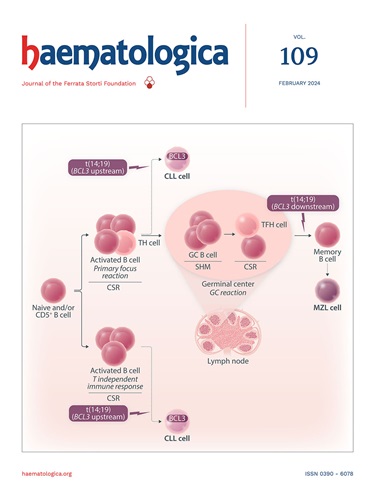Improving chronic myeloid leukemia management and quality of life: patient and physician survey on unmet needs from the CML SUN survey.
IF 7.9
1区 医学
Q1 HEMATOLOGY
引用次数: 0
Abstract
For patients with chronic myeloid leukemia in chronic phase (CML-CP), disease management, treatment experiences, and decisions around switching therapies due to resistance or intolerance can have significant impacts on their lives. Experiences and perspectives regarding the roles of patients and treating physicians in shared decision-making are poorly understood. The CML Survey on Unmet Needs (CML SUN), the largest CML survey to date, was initiated to gather insights from patients with CML-CP and physicians on disease management, including treatment goals, decision-making, satisfaction, tolerability and the impact of CML on daily life. The survey was deployed in 11 countries with 361 patient and 198 physician participants and comprised separate questionnaires for each group. Results indicated that nearly three-quarters of physicians saw themselves as the ultimate initial treatment decision-makers; only a quarter of patients reported that these decisions were discussed and decided together with their physician. Nearly half of physicians reported making treatment decisions across all lines of therapy with little to no input from the patient. Disparities between patient and physician opinions were observed regarding treatment goals, especially the balance between efficacy and tolerability. The CML SUN highlights the need for improvements in communication about treatment options and the importance of shared treatment decisionmaking to unify treatment goals.改善慢性髓性白血病管理和生活质量:来自CML SUN调查的未满足需求的患者和医生调查。
对于慢性髓性白血病慢性期(CML-CP)患者,疾病管理、治疗经验以及因耐药或不耐受而切换治疗的决定可能对他们的生活产生重大影响。关于患者和治疗医生在共同决策中的作用的经验和观点理解得很少。CML未满足需求调查(CML SUN)是迄今为止规模最大的CML调查,旨在收集CML- cp患者和医生对疾病管理的见解,包括治疗目标、决策、满意度、耐受性和CML对日常生活的影响。这项调查在11个国家开展,共有361名患者和198名医生参与,每组都有单独的问卷调查。结果表明,近四分之三的医生认为自己是最终的初始治疗决策者;只有四分之一的患者报告说,这些决定是与他们的医生讨论和决定的。近一半的医生报告说,在几乎没有患者意见的情况下,他们就做出了所有治疗方案的治疗决定。在治疗目标方面,患者和医生的意见存在差异,特别是在疗效和耐受性之间的平衡。CML SUN强调了改善治疗方案沟通的必要性,以及共享治疗决策以统一治疗目标的重要性。
本文章由计算机程序翻译,如有差异,请以英文原文为准。
求助全文
约1分钟内获得全文
求助全文
来源期刊

Haematologica
医学-血液学
CiteScore
14.10
自引率
2.00%
发文量
349
审稿时长
3-6 weeks
期刊介绍:
Haematologica is a journal that publishes articles within the broad field of hematology. It reports on novel findings in basic, clinical, and translational research.
Scope:
The scope of the journal includes reporting novel research results that:
Have a significant impact on understanding normal hematology or the development of hematological diseases.
Are likely to bring important changes to the diagnosis or treatment of hematological diseases.
 求助内容:
求助内容: 应助结果提醒方式:
应助结果提醒方式:


